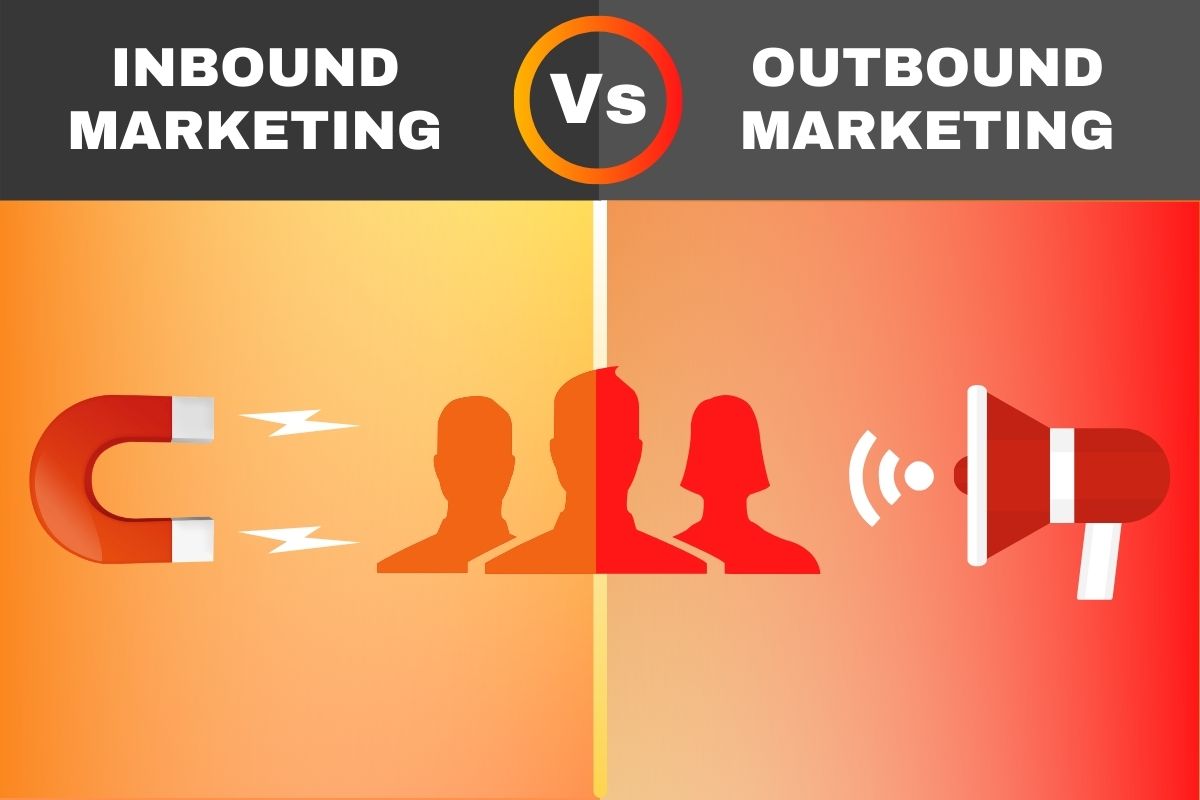Marketers engage in two fundamentally different types of marketing: inbound and outbound. Outbound marketing has been with us since the dawn of advertising and sales, while inbound marketing largely owes its existence to the internet. However, there remains some confusion as to what constitutes outbound versus inbound marketing.
Outbound Marketing Explained
Outbound marketing is the art and science of throwing marketing messages at consumers and hoping they stick long enough for the consumer to buy. These messages can range from a banner ad on the web to a door-to-door salesman giving you his spiel.
You may be wondering what those two outbound marketing methods have in common. The answer that is that they disrupt the consumer experience to present them with these messages regardless of whether the consumer has indicated their interest. The banners that crawl across your screen may be indirectly related to what you’re browsing, but you’re seeing them whether you expressed interest in that type of product or not. The door-to-door salesman is literally showing up on your doorstep and interrupting your day to present a product to you even if you have no need for nor had expressed interest in said product.
As you can imagine, the disruptive nature of outbound marketing leads to dismal rates of effectiveness. For instance, only 0.05% of viewers of a banner or display ad actually click on it, and according to SmallBizGenius, the average person only sees half the banner ads displayed during a given web browsing session. Note that we don’t include pay-per-click ads in the category of outbound marketing because in that case, the prospect is actually inputting what they’re looking for and receiving results related to that input. That interaction makes PPC an inbound marketing vehicle, though not a particularly effective one.
Inbound Marketing Explained
The interactive nature of the internet has given rise to an entirely new marketing paradigm. It’s called “inbound marketing” because instead of companies continually pushing marketing messages at consumers, the consumer is the one pursuing their desired product. As you can imagine, this makes for far more effective and efficient marketing campaigns.
Inbound marketing compels consumers to pursue their desired product through the publication of quality content. For instance, say you search for a certain product type and come across an intriguing article in a publication you recognize; you then follow a link from that post to the ecommerce store of the company that sells that product. That’s inbound marketing in action.
Examples of Inbound Marketing
Inbound marketing did not get its start on the internet. There was one particular vehicle which facilitated inbound marketing long before a blog was even a twinkle in someone’s eye. It was called the Yellow Pages. Here was a directory loaded with companies divided into hundreds of categories. If you were looking for a particular service, odds were good that you could find it in your local Yellow Pages. Meanwhile, companies were ecstatic that they had a place to advertise that wasn’t a shot in the dark like a newspaper ad. Of course, they paid for the privilege, but the Yellow Pages’ effectiveness as a marketing medium made it worthwhile.
With the advent and evolution of the internet, sites like Yelp and Google Business listings have become the Yellow Pages. They connect companies that provide a particular service with consumers searching for that service. But that’s just one component of inbound marketing that facilitates a direct connection between consumers and brands. There are many more subtle ways to make this connection that consumers enjoy and companies find to be particularly effective.
Blogger Outreach
Here’s a form of inbound marketing whereby a company reaches out to a popular blogger in their shared niche and says: “Hey, we have a product we think you’ll be interested based on your blog topics to date. Would you like to take it for a test drive in return for a mention on your blog?”
Everybody wins here. The blogger wins because they get to try out a cool new product; the consumer wins because they are presented with relevant info regarding a product they may be interested in purchasing; and the company wins because their product receives organic buzz on the web, which is much more targeted and effective than a typical ad. Of course, if their product proves to be subpar, or worse, it turns out not to be in the blogger’s niche, they’re opening themselves up for some very public criticism. That’s why honesty and transparency is so crucial in inbound marketing.
Social Media
While a blog is a form of social media, it’s platforms such as Facebook, Twitter and Instagram that are hotbeds of viral content. These three channels are the quickest ways to get an article that makes mention of your brand in front of as many people as possible. Maybe it will be written by a niche blogger; maybe it will be ghost-written in a popular publication; but whoever publishes it to social media, the end result is excited traffic coming from a reputable source straight to your company’s website.
Backlink Building
This is an aspect of search engine optimization, which is yet another inbound marketing component. Backlinking is the art and science of attracting links to your site from high-value sources. These are typically websites with a high domain authority that link to you in a natural way. Search engines have done a lot to crack done on quantity-over-quality backlinking practices, so these days the domain authority of your backlink profile is more important than the sheer number of backlinks that point to your site. Done correctly, a successful backlinking strategy can significantly improve your search engine ranking and make it that much easier for consumers to find you.
Inbound Marketing with ArticleHub
Think of ArticleHub is your inbound marketing onramp. Whether you want to reach out to compatible bloggers, see your brand mentioned in top-tier publications, or fuel a higher search engine ranking with a more effective backlink profile, our team has done it all for upwards of 15 years. Explore how inbound marketing can effectively spread word of your brand at a fraction of the cost of a typical outbound marketing campaign.




